Reactscape device:space
academia
Articulated Surface
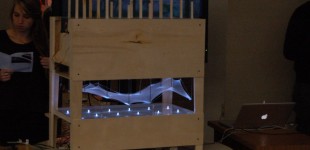
Dynamic Installation or Articulated Surface is one of three projects that addressed the transfer of data from an ecological system to an installation. The project was developed by Justine Holzman and Luke Venable. Full PDF Proposal To re-conceptualize the network of information generated by the mobile hunting camp modules, the mobile responsive hunting camp module […]
Vacuolar Effluvia Genesis
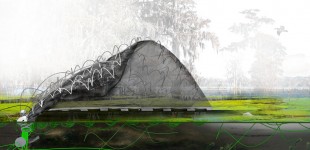
Project VEG or Vacuolar Effluvia Genesis looks at technologies that facilitate the sequestration of ecological processes that are detrimental to the Atchafalaya ecosystem. The proposal was developed by Josh Brooks and Kim Nguyen. Full PDF Proposal Vacuolar Effluvia Genesis, if following the dictionary, is defined by the sequestration of a waste product or harmful substance as to create something […]
POD MOD
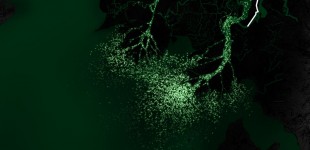
The POD MOD proposal addresses issues of sedimentation, dredging for navigation and optimized land building at the mouth of the Atchafalaya Basin near the Gulf of Mexico. Essentially the proposal contends that by creating sediment ballonets that can be floated from the top of the Atchafalaya down the river it would be possible to use […]
Land Building
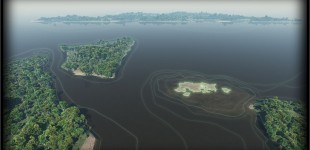
Devon Boutte and Martin Moser developed the land building logics Phase 02 proposal that evolved from the original ecolibrium proposal from Phase 01. Full Proposal The proposal for this project expands on several discrete aspects of the City Sense project Ecolibrium. Ecolibrium proposed utilizing real time data sensing in the Atchafalaya basin to convert negative […]
Ecolibrium
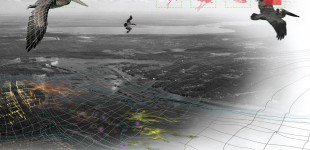
Ecolibrium is the Phase 01 competition proposal for the RRSLA Responsive Systems Fall 2011 Studio. The proposal was developed by Devon Boutte, Josh Brooks, Kim Nguyen, Martin Moser, Hunter Lero and Danielle Martin. Student imagery and words below. The Atchafalaya Basin is a vast tract of cypress swamp, which occupies approximately 3000 square miles of […]
Responsive Systems Studio Fall 2011
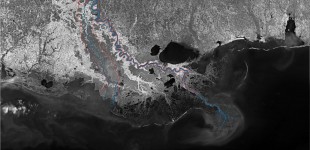
I had the pleasure to teach one of the Advanced Topic studios this Fall at the LSU Robert Reich School of Landscape Architecture and working with Frank Melendez in the LSU School of Architecture we had the students explore responsive technologies in sites within the Atchafalaya Basin. For those unfamiliar with the basin it is a distributary […]
Backyard Farm Service wins ASLA Research Award
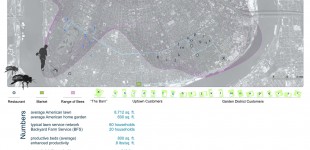
We are really excited that Backyard Farm Service has been recognized with a National ASLA Honor Award for research. The project has received a lot of discussion since it was submitted for the One Prize and we are happy to see that the jury saw some merit in its approach.
Hybrid Analytical Landscapes
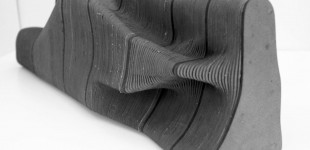
At CELA 2011 I had the opportunity to present the work Kristi Cheramie and I have assembled that led to the teaching of the Hybrid Analytical Landscapes course in the 2011 wintersession at LSU. The work was well received overall although we were not able to have a critical discussion during the panel due to […]
Latest Site Observations
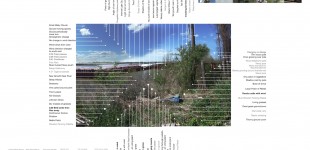
My design studio was asked to observe site phenomena and features through a 3hr site visit this past Friday. Each student was asked to create an annotated illustration that captured 60 observations and 30 events over the 3hrs. While many of the events and observations are initially mundane most students came away with a greater […]
Backyard Farm Service
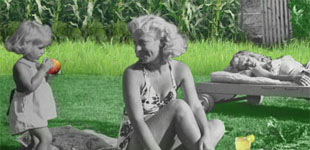
We are very excited to have been selected as semi-finalists for the One Prize: Mowing to Growing competition. There were many exciting proposals looking at a range of solutions and some great finalists. I worked closely with my colleagues Aron Chang, Natalie Yates and Patrick Michaels and our proposal focused on developing a service that […]
LSU Design Week 2010
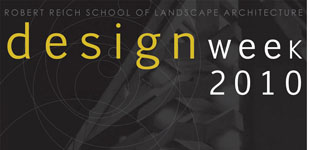
Flickr Photo Pool Design Week at the Robert Reich School of Landscape Architecture finished up last Friday (Jan 29th). This year the format was slightly different, instead of inviting a single practitioner/academic to host design week we decided to invite four visitors with varying backgrounds.
Digital Drawing for Landscape Architects
Reviewing the page proofs for the book which is exciting, slowly going through the proofs. We have a short foreword from Ken Smith which frames the book nicely and there is a good deal of information for beginning landscape students and professionals that are looking to get their head around digital techniques. The cover is […]
language {..II..}
Developing a mediating language through abstraction creates an approach that addresses simultaneous issues in enviro-tech interfaces for sensing, responsiveness, automation, and interactivity. This language exists in the liminal realm between dry {technology} and wet {biology} attempting to embrace a moist medium (roy ascott). Abstraction addresses simultaneous modes of complexity that exist in both dry and […]
Language
There have been discussions, within the Lab, about language to talk between machines, environment, and people. This comes in multiple forms, from a design standpoint to a logical interface between chaotically complex components. This lends itself to the development of methods of abstraction, taking infinitely complex organism and finding threads to abstract information meaningfully.
scale and resolution
A lot of thought has been circulating regarding scale and resolution in regards to perception, sensing, and visualization. Allowing an objects scale to be manipulated and projected re-contextualizes the object… The issue comes up that the projection itself can create the re-contextualization but developing a framework that keeps the object relevant and the space fragmented […]
sensed perception
Several new projects underway that are extensions of work from sensing the landscape and representation workflows. Looking at digital representation it is interesting to note the expression of the design drawings as product of their medium. There are a few things to really express within this framework … image/design context, cut and paste collage, and […]